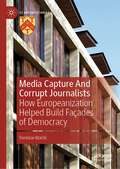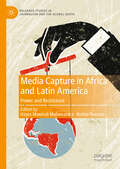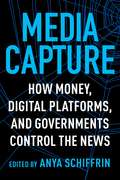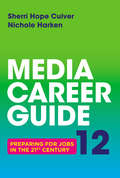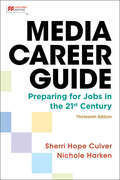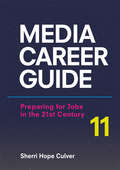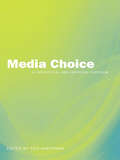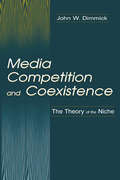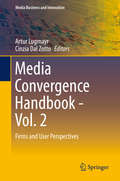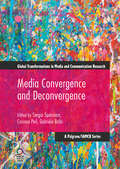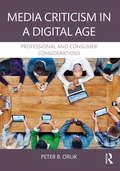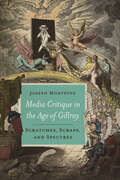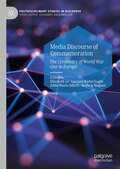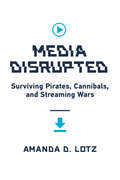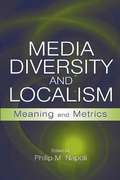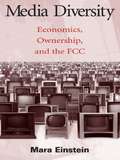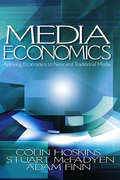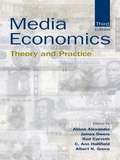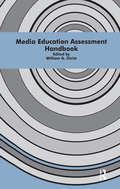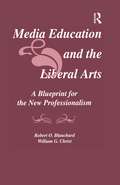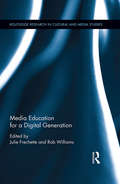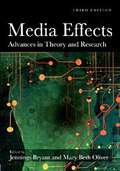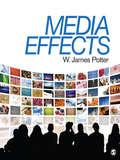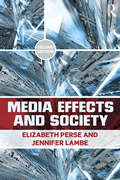- Table View
- List View
Media Capture And Corrupt Journalists: How Europeanization Helped Build Façades of Democracy (St Antony's Series)
by Tomislav MaršićThis book explores the form, dynamics, and main reasons for media capture and conspiracy between editors and executive politicians in Central and Eastern Europe (CEE) since 2000. Situated in the literatures on Europeanization, democratization, party studies, and media studies, the book aims to connect these fields by showing that internal party dynamics play an important role in motivating executive politicians to hijack or collaborate with media. Against this backdrop, the book tells the story of Croatian journalism in the context of media-mafia conglomerates, political corruption, and media hijacking, and examines how "traditional" democratic drivers that the literature frequently cites, such as Europeanization and party competition, failed to prevent systematic transgressions by politicians. Methodologically, the book takes a two-pronged approach. First, nearly 50 interviews were conducted with Croatian investigative journalists, from which the narratives about the relationships between government politicians and editors over 15 years were reconstructed. In a second step, a sample of 40,000 media articles was subjected to a computational sentiment analysis, covering the same 15-year period and showing high levels of cooperation between corrupt politicians and corrupt media outlets.
Media Capture in Africa and Latin America: Power and Resistance (Palgrave Studies in Journalism and the Global South)
by Hayes Mawindi Mabweazara Bethia PearsonHow can current debates on ‘media capture’ be understood within the contexts of Africa and Latin America? This edited collection provides a nuanced exploration of media capture—a critical yet contested concept that examines and illuminates how media can become skewed in favour of power—while also highlighting spaces and strategies of resistance. By adopting a South-South perspective, it brings together scholars focused on these issues in both regions, featuring a dialogue between two leading scholars, Herman Wasserman and Silvio Waisbord in the Foreword. The book not only demonstrates how media practices in Africa and Latin America are influenced by the political economy of their media systems, but also contributes significantly to advancing empirical, theoretical, and comparative research on media in non-Western settings.
Media Capture: How Money, Digital Platforms, and Governments Control the News
by Edited by Anya SchiffrinWho controls the media today? There are many media systems across the globe that claim to be free yet whose independence has been eroded. As demagogues rise, independent voices have been squeezed out. Corporate-owned media companies that act in the service of power increasingly exercise soft censorship. Tech giants such as Facebook and Google have dramatically changed how people access information, with consequences that are only beginning to be felt.This book features pathbreaking analysis from journalists and academics of the changing nature and peril of media capture—how formerly independent institutions fall under the sway of governments, plutocrats, and corporations. Contributors including Emily Bell, Felix Salmon, Joshua Marshall, Joel Simon, and Nikki Usher analyze diverse cases of media capture worldwide—from the United Kingdom to Turkey to India and beyond—many drawn from firsthand experience. They examine the role played by new media companies and funders, showing how the confluence of the growth of big tech and falling revenues for legacy media has led to new forms of control. Contributions also shed light on how the rise of right-wing populists has catalyzed the crisis of global media. They also chart a way forward, exploring the growing need for a policy response and sustainable models for public-interest investigative journalism. Providing valuable insight into today’s urgent threats to media independence, Media Capture is essential reading for anyone concerned with defending press freedom in the digital age.
Media Career Guide: Preparing For Jobs In The 21st Century (Twelfth Edition)
by Sherri Hope Culver Nichole HarkenTargeted to today's media-savvy students, the eleventh edition of Media Career Guide includes the latest information on the emerging employment opportunities in mobile media, as well as tips for developing and honing professional networking skills. This essential manual provides an updated, comprehensive directory of media jobs, and walks readers through the entire job-search process, from researching a company to applying for jobs to displaying appropriate behavior in the workplace.
Media Career Guide: Preparing for Jobs in the 21st Century
by Sherri Hope Culver Nichole HarkenWith a focus on getting media-savvy students ready for a career in media, this essential guide offers a current snapshot of job prospects and opportunities in media and communication. The authors take students through the entire process of career planning, from first considering a media-related career, all the way through their arrival in the workplace, while offering helpful and practical advice and strategies along the way. This edition has a new organization that starts at determining the career and then moves into finding the job. A new focus on growth areas in media industries highlight new career paths in streaming media and app development as well as new media positions within more traditional fields. New life skill tips offer suggestions on issues like how to relocate, manage finances, and more. Available as an e-book, the guide can be purchased on its own, or can be accessed as part of the LaunchPad for Media & Culture 13e by Richard Campbell, Christopher R. Martin, Bettina Fabos, and Ron Becker.
Media Career Guide: Preparing for Jobs in the 21st Century
by Sherri Hope CulverIn this economic climate, students need more help than ever navigating the media job marketplace. By providing practical career tips and current statistics, the Media Career Guide is the ideal starting point for a successful communication-related job search. Beginning with an overview of today’s employment environment and opportunities, the manual guides readers through the process of researching, interviewing for, and landing that perfect media job. The new edition now offers career advice from real media professionals and emphasizes the importance of creating and maintaining a professional online presence for the workplace. And, with added information on how to start your own business, students will find this guide to be a useful resource no matter what media career path they choose.
Media Choice: A Theoretical and Empirical Overview
by Tilo HartmannThis volume represents the next generation of research in media psychology, bridging selective exposure into a larger framework of choice in media usage. Considering the myriad media options available to use, this work seeks to answer such questions as: What mechanisms guide an individual's exposure to/choice of media? How can researchers model them? The questions why and how people decide to use media offerings are key in current communication scholarship. Research on selective exposure has addressed this area in the past, but the term 'media choice' is used here to represent any implicit/automatic/spontaneous or explicit/deliberate 'decisions' of the users and subsequent behavioral consequences that lead to a contact with a media stimulus.
Media Commercialization and Authoritarian Rule in China
by Daniela StockmannIn most liberal democracies commercialized media is taken for granted, but in many authoritarian regimes the introduction of market forces in the media represents a radical break from the past with uncertain political and social implications. In Media Commercialization and Authoritarian Rule in China, Daniela Stockmann argues that the consequences of media marketization depend on the institutional design of the state. In one-party regimes such as China, market-based media promote regime stability rather than destabilizing authoritarianism or bringing about democracy. By analyzing the Chinese media, Stockmann ties trends of market liberalism in China to other authoritarian regimes in the Middle East, North Africa, sub-Saharan Africa, and the post-Soviet region. Drawing on in-depth interviews with Chinese journalists and propaganda officials as well as more than 2,000 newspaper articles, experiments, and public opinion data sets, this book links censorship among journalists with patterns of media consumption and media's effects on public opinion.
Media Competition and Coexistence: The Theory of the Niche (Routledge Communication Series)
by John W. DimmickThis volume considers how media firms, as well as entire industries, exist and persist over time despite what often seems to be intense competition for such resources as audiences and advertisers. Addressing competition within and among media organizations and industries, including broadcasting, cable, and the Internet, author John W. Dimmick studies the media industries through the niche theory lens, developed by bioecologists to explain competition and coexistence. He examines the targets of the different media--audience, advertisers, money--and how they compete, using examples from a variety of studies. Each chapter incorporates relevant economic constructs into the analytic framework. This approach includes the use of economics of scale to explain selection and firm mortality in newspapers and movie theaters; the application of the transaction costs concept to explicate the rise of advertising agencies; the employment of the strategic group concept in analyzing the niche breadth strategy; and the measurement of gratifications-utilities. A comprehensive overview of the determinants of media competition and coexistence, Media Competition and Coexistence: The Theory of the Niche offers unique insights for scholars, students, researchers, and practitioners in media economics, management, and business.
Media Convergence Handbook - Vol. 1
by Artur Lugmayr Cinzia Dal ZottoThe Media Convergence Handbook sheds new light on the complexity of media convergence and the related business challenges. Approaching the topic from a managerial, technological as well as end-consumer perspective, it acts as a reference book and educational resource in the field. Media convergence at business level may imply transforming business models and using multiplatform content production and distribution tools. However, it is shown that the implementation of convergence strategies can only succeed when expectations and aspirations of every actor involved are taken into account. Media consumers, content producers and managers face different challenges in the process of media convergence. Volume I of the Media Convergence Handbook encourages an active discourse on media convergence by introducing the concept through general perspective articles and addressing the real-world challenges of conversion in the publishing, broadcasting and social media sectors.
Media Convergence and Deconvergence (Global Transformations in Media and Communication Research - A Palgrave and IAMCR Series)
by Corinna Peil Sergio Sparviero Gabriele BalbiThis edited volume explores different meanings of media convergence and deconvergence, and reconsiders them in critical and innovative ways. Its parts provide together a broad picture of opposing trends and tensions in media convergence, by underlining the relevance of this powerful idea and emphasizing the misconceptions that it has generated. Sergio Sparviero, Corinna Peil, Gabriele Balbi and the other authors look into practices and realities of users in convergent media environments, ambiguities in the production and distribution of content, changes to the organization of media industries, the re-configuration of media markets, and the influence of policy and regulations. Primarily addressed to scholars and students in different fields of media and communication studies, Media Convergence and Deconvergence deconstructs taken-for-granted concepts and provides alternative and fresh analyses on one of the most popular topics in contemporary media culture.Chapter 1 is available open access under a CC BY 4.0 license at link.springer.com
Media Criticism in a Digital Age: Professional And Consumer Considerations
by Peter B. OrlikMedia Criticism in a Digital Age introduces readers to a variety of critical approaches to audio and video discourse on radio, television and the Internet. It is intended for those preparing for electronic media careers as well as for anyone seeking to enhance their media literacy. This book takes the unequivocal view that the material heard and seen over digital media is worthy of serious consideration. Media Criticism in a Digital Age applies key aesthetic, sociological, philosophical, psychological, structural and economic principles to arrive at a comprehensive evaluation of programming and advertising content. It offers a rich blend of insights from both industry and academic authorities. These insights range from the observations of Plato and Aristotle to the research that motivates twenty-first century marketing and advertising. Key features of the book are comprised of: multiple video examples including commercials, cartoons and custom graphics to illustrate core critical concepts; chapters reflecting today’s media world, including coverage of broadband and social media issues; fifty perceptive critiques penned by a variety of widely respected media observers and; a supplementary website for professors that provides suggested exercises to accompany each chapter (www.routledge .com/cw/orlik) Media Criticism in a Digital Age equips emerging media professionals as well as perceptive consumers with the evaluative tools to maximize their media understanding and enjoyment.
Media Critique in the Age of Gillray: Scratches, Scraps, and Spectres
by Joseph MonteyneIn the late 1790s, British Prime Minister William Pitt created a crisis of representation when he pressured the British Parliament to relieve the Bank of England from its obligations to convert paper notes into coin. Paper quickly became associated with a form of limitless reproduction that threatened to dematerialize solid bodies and replace them with insubstantial shadows. Media Critique in the Age of Gillray centres on printed images and graphic satires which view paper as the foundation for the contemporary world. Through a focus on printed, visual imagery from practitioners such as James Gillray, William Blake, John Thomas Smith, and Henry Fuseli, the book addresses challenges posed by reproductive technologies to traditional concepts of subjective agency. Joseph Monteyne shows that the late eighteenth-century paper age’s baseless fabric set the stage for contemporary digital media’s weightless production. Engagingly written and abundantly illustrated, Media Critique in the Age of Gillray highlights the fact that graphic culture has been overlooked as an important sphere for the production of critical and self-reflective discourses around media transformations and the visual turn in British culture.
Media Discourse of Commemoration: The Centenary of World War One in Europe (Postdisciplinary Studies in Discourse)
by Hedwig Wagner Elisabeth Le Luciana Radut-Gaghi Alida Maria SillettiThis book explores how First World War commemoration events are presented, reported and mediated on the websites of mainstream daily newspapers from seven European countries. The book is the result of a research group – DIREPA-EUROPE (Discours, représentations, passé de l’Europe), part of Lemel research network – characterized by a shared interest in media discourse and online newspapers. It presents a fluid analysis chain on the commemoration discourse generated by the WWI Armistice Centenary in 2018, and will be of interest not only to scholars of discourse and media studies, but also of European history, cultural memory, journalism and conflict studies.
Media Disrupted: Surviving Pirates, Cannibals, and Streaming Wars
by Amanda D. LotzHow the internet disrupted the recorded music, newspaper, film, and television industries and what this tells us about surviving technological disruption.Much of what we think we know about how the internet "disrupted" media industries is wrong. Piracy did not wreck the recording industry, Netflix isn't killing Hollywood movies, and information does not want to be free. In Media Disrupted, Amanda Lotz looks at what really happened when the recorded music, newspaper, film, and television industries were the ground zero of digital disruption. It's not that digital technologies introduced "new media," Lotz explains; rather, they offered existing media new tools for reaching people. For example, the MP3 unbundled recorded music; as the internet enabled new ways for people to experience and pay for music, the primary source of revenue for the recorded music industry shifted from selling music to licensing it. Cable television providers, written off as predigital dinosaurs, became the dominant internet service providers. News organizations struggled to remake businesses in the face of steep declines in advertiser spending, while the film industry split its business among movies that compelled people to go to theaters and others that are better suited for streaming. Lotz looks in detail at how and why internet distribution disrupted each industry. The stories of business transformation she tells offer lessons for surviving and even thriving in the face of epoch-making technological change.
Media Diversity and Localism: Meaning and Metrics (Routledge Communication Series)
by Philip M. NapoliQuestions concerning the quality of media performance and the effectiveness of media policymaking often revolve around the extent to which the media system fulfills the values inherent in diversity and localism principles. This edited volume addresses challenges and issues relating to diversity in local media markets from a media law and policy perspective. Editor Philip M. Napoli provides a conceptual and empirical framework for assessing the success/failure of media markets and media outlets in fulfilling diversity and localism objectives. Featuring well-known contributors from a variety of disciplines, including media, law, political science, and economics, Media Diversity and Localism explores the following topics:*media ownership and media diversity and localism;*conceptual and methodological issues in assessing media diversity and localism;*minorities, media, and diversity; and*contextualizing media diversity and localism: audience behavior and new technologies. This substantive and timely volume speaks to scholars and researchers in the areas of media law and policy, political science, and all others interested in media regulation. It can also be used in a graduate seminar on media policy topics.
Media Diversity: Economics, Ownership, and the Fcc (Routledge Communication Series)
by Mara EinsteinMedia Diversity: Economics, Ownership, and the FCC provides a detailed analysis of the regulation of diversity and its impact on the structure and practices within the broadcast television industry. As deregulation is quickly changing the media landscape, this volume puts the changing structure of the industry into perspective through the use of an insider's point of view to examine how policy and programming get made. Author Mara Einstein blends her industry experience and academic expertise to examine diversity as a media policy, suggesting that it has been ineffective and is potentially outdated, as study after study has found diversity regulations to be wanting. In addition to reviewing diversity research on the impact of minority ownership, regulation of cable and DBS, duopolies, ownership of multiple networks and cross ownership of media on program content, Einstein considers the financial interest and syndication rules as a case study, due to their profound effects on the structure of the television industry. She also poses questions from an economic perspective on why the FCC regulates structure rather than content. Through the presentation of her research results, she argues persuasively that the consolidation of the media industry does not affect the diversity of entertainment programming, a conclusion with broad ramifications for all media and for future research about media monopolies. This volume serves as a defining work in its examination of the intersection of regulation and economics with media content. It is appropriate as a supplemental text in courses on communication policy, broadcast economic and media management, broadcast programming, political economy of the mass media, and media criticism at the advanced and graduate level. It is also likely to interest broadcast professionals, media policymakers, communication lawyers, and academics. It is a must-read for all who are interested in the media monopoly debate.
Media Economics: Applying Economics to New and Traditional Media
by Dr Colin Hoskins Dr Stuart M. McFadyen Dr Adam FinnMedia Economics: Applying Economics to New and Traditional Media differs from ordinary media economic texts by taking a conceptual approach to economic issues. As the book progresses through economic principles, authors Colin Hoskins, Stuart McFadyen, and Adam Finn use cases and examples to demonstrate how these principles can be used to analyze media issues and problems. Media Economics emphasizes economic concepts that have distinct application within media industries, including corporate media strategies and mergers, public policy within media industries, how industry structure and changing technologies affect the conduct and performance of media industries, and why the United States dominates trade in information and entertainment.
Media Economics: Theory and Practice (Routledge Communication Series)
by Alison Alexander Rod Carveth C. Ann Hollifield Albert N. Greco James OwersMedia Economics: Theory and Practice focuses on the basic principles of economics in the business sector and applies them to contemporary media industries. This text examines the process of media economics decision making through an exploration of key topics, such as industrial restructuring, regulatory constraints upon media operations, and changing economic value, providing key insights into media business activities. With the structure and value of media industries changing rapidly and sometimes dramatically, this text moves beyond a basic documentation of historical patterns to help readers understand the mechanics of change, offering insight into the processes reproducing contemporary trends in media economics. Thoroughly updated in this third edition, Media Economics focuses on the primary concerns of media economics, the techniques of economic and business analysis, and the overall characteristics of the media environment; and explores contemporary business practices within specific media industries, including newspaper, magazine, television, cable, movie, radio advertising, music, and online industries. New for this edition are chapters on the advertising, book publishing, and magazine publishing industries. Chapters contributed by expert scholars and researchers provide substantial discussions of the crucial topics and issues in the media industry sectors, and emphasize both domestic and international businesses. Offering a thorough examination of the economic factors and forces concerning the media industries, Media Economics is appropriate for use as a course text for advanced media management and economics students. It also serves as an indispensable reference for scholars and researchers in media business arenas.
Media Education Assessment Handbook: A Resource Handbook For Educators And Administrators: Component 3: Developing An Assessment Plan (Routledge Communication Series)
by William G. ChristAssessing media education is a formidable task because both assessment and media education are complex and controversial concepts. Assessment, which can take place at the individual student, class, sequence, program, department or unit, and university levels, is questioned in terms of reliability, validity, relevance, and cost. Media education, which has been challenged at a number of schools, finds faculty and administrators in the midst of soul-searching about how to clearly articulate its missions and purposes to a broader audience. Departments are under increasing national, state, and institutional pressure to get assessment procedures carried out quickly, but there is an obvious danger in rushing to implement assessment strategies before establishing what is essential in media education. In communication education in general, the "what" of assessment is often discussed in terms of skills, attitudes, affect, values, and knowledge. People assess students to determine what they know, think, feel, value, and can do. Here it is suggested that one of the places to start defining what students should learn from their media education is by identifying outcomes. Outcomes can be assessed in a variety of ways, but first they need to be developed and clearly articulated.
Media Education and the Liberal Arts: A Blueprint for the New Professionalism (Routledge Communication Series)
by William G. Christ Robert O. BlanchardThis book provides academic reformers with a blueprint for tackling the upheaval facing media education. It calls for a new professionalism that rejects the status quo, reflects the mission and diversity of individual programs, and demands a redefinition of both traditional media studies and the liberal arts. The book directs philosophical assaults and uses real-life examples to challenge the paralyzing effects of the "seven deadly sins" of media education.
Media Education for a Digital Generation (Routledge Research in Cultural and Media Studies)
by Rob Williams Julie FrechetteMedia education for digital citizenship is predicated upon the ability to access, analyze, evaluate and produce media content and communication in a variety of forms. While many media literacy approaches overemphasize the end-goal of accessing digital media content through the acquisition of various technology, software, apps and analytics, this book argues that the goals for comprehensive and critical digital literacy require grasping the means through which communication is created, deployed, used, and shared, regardless of which tools or platforms are used for meaning making and social interaction. Drawing upon the intersecting matrices of digital literacy and media literacy, the volume provides a framework for developing critical digital literacies by exploring the necessary skills and competencies for engaging students as citizens of the digital world.
Media Effects
by Jennings Bryant Mary Beth OliverWith contributions from some of the finest scholars in the discipline, Media Effects serves not only as a comprehensive reference volume for media effects study but also as an exceptional textbook for advanced courses in media effects. Covering the breadth of the media effects arena, this third edition provides updated material as well as new chapters focusing on effects of mobile media and other technologies. As this area of study continues to evolve, Media Effects will serve as a benchmark of theory and research for current and future generations of scholars.
Media Effects
by W. James PotterMedia Effects provides students with an in-depth understanding of how the media are constantly influencing individuals and society. W. James Potter guides readers through the extensive body of research on the effects of the mass media by organizing the book around two Media Effects Templates. The first template helps organize thinking about media influences on individuals, and the second focuses on media influences on larger social structures and institutions. Throughout the book, Potter encourages students to analyze their own experiences tby searching for evidence of these effects in their own lives, making the content meaningful.
Media Effects and Society (Routledge Communication Series)
by Elizabeth M. Perse Jennifer LambeGrounded in theoretical principle, Media Effects and Society help students make the connection between mass media and the impact it has on society as a whole. The text also explores how the relationship individuals have with media is created, therefore helping them alleviate its harmful effects and enhance the positive ones. The range of media effects addressed herein includes news diffusion, learning from the mass media, socialization of children and adolescents, influences on public opinion and voting, and violent and sexually explicit media content. The text examines relevant research done in these areas and discusses it in a thorough and accessible manner. It also presents a variety of theoretical approaches to understanding media effects, including psychological and content-based theories. In addition, it demonstrates how theories can guide future research into the effects of newer mass communication technologies. The second edition includes a new chapter on effects of entertainment, as well as text boxes with examples for each chapter, discussion of new technology effects integrated throughout the chapters, expanded pedagogy, and updates to the theory and research in the text. These features enhance the already in-depth analysis Media Effects and Society provides.
